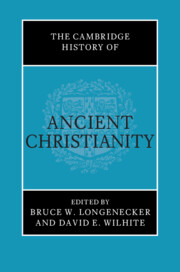Book contents
- The Cambridge History of Ancient Christianity
- The Cambridge History of Ancient Christianity
- Copyright page
- Contents
- Figures
- List of Contributors
- Editors’ Preface
- Part I Contested Contexts
- Part II Contested Figures
- 5 Remembering Jesus in Earliest Christianity
- 6 Remembering Jesus in the Second and Third Centuries CE
- 7 Paul and His Diverse Champions
- 8 Peter and His Diverse Champions
- Part III Contested Heritage
- Part IV Contested Cultures
- Part V Contested Beliefs
- Part VI Contested Bodies
- Ancient Sources
- Modern Authors
- References
5 - Remembering Jesus in Earliest Christianity
The What and How of Socially Framed Memory
from Part II - Contested Figures
Published online by Cambridge University Press: 23 August 2023
- The Cambridge History of Ancient Christianity
- The Cambridge History of Ancient Christianity
- Copyright page
- Contents
- Figures
- List of Contributors
- Editors’ Preface
- Part I Contested Contexts
- Part II Contested Figures
- 5 Remembering Jesus in Earliest Christianity
- 6 Remembering Jesus in the Second and Third Centuries CE
- 7 Paul and His Diverse Champions
- 8 Peter and His Diverse Champions
- Part III Contested Heritage
- Part IV Contested Cultures
- Part V Contested Beliefs
- Part VI Contested Bodies
- Ancient Sources
- Modern Authors
- References
Summary
Remembering Jesus is an ongoing activity. It began within Jesus’s own lifetime but continues to the present. The contexts, controls, and creativity of remembering Jesus are, therefore, not exclusive to how Jesus was remembered from the earliest time – they are also relevant to each generation’s present. With this in mind, historians who focus on Jesus must (1) attend to the material, literary, and social history of the Second Temple period, and (2) attend to their own placement, agenda, and historical vantage point. So remembering Jesus is as much about self-awareness as it is about studying ancient history. For these reasons, a robust theory of memory is required, one that helps us navigate the mnemonic frameworks of earliest Christianity as well as how our memory works more generally. We will examine the earliest Christian creed (or hymn) as it is quoted by Paul’s letter to the Romans. That said, the bulk of this essay will address Jesus and memory as topics for historians in the twenty-first century. Our aim is to explain how and why theories of memory have become integral to scholars of the Jesus tradition.
- Type
- Chapter
- Information
- The Cambridge History of Ancient Christianity , pp. 109 - 129Publisher: Cambridge University PressPrint publication year: 2023

